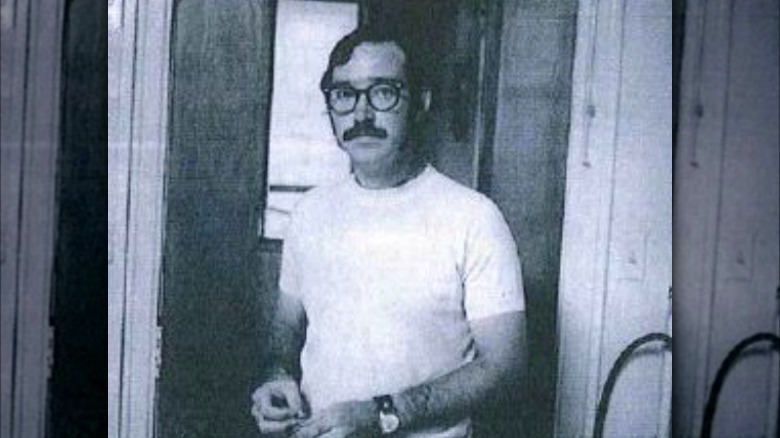How The 1982 Murder Of Lee Rotatori Was Finally Solved
On the afternoon of June 25, 1982, authorities were called to the Best Western Frontier Motor Lodge in Council Bluffs, Iowa, on reports of a suspicious death. As reported by Iowa Cold Cases, a motel employee discovered the body of a woman in Room 106 at approximately 12:30 p.m., and it appeared that she had been murdered.
When the police arrived on the scene, they found a deceased woman laying on her back on the floor next to the bed. According to Iowa Cold Cases, she was wearing pajamas and laying in a pool of blood. The woman, who was later identified as 32-year-old Lee Rotatori, had been stabbed to death inside her motel room. However, authorities did not find any evidence to suggest forced entry to the room or any kind of struggle.
In the weeks prior to her death, Rotatori traveled to Council Bluffs from Nunica, Michigan, for a job at Edmundson Hospital — where she was recently hired as the new food service director. She had planned to stay at the Best Western while she attended training sessions and the orientation for her new job. Her husband, Gerald Stanley "Jerry" Nemke, arranged to transport their mobile home from Michigan and meet his wife in Council Bluffs.
Lee Rotatori's husband had a previous murder conviction
According to The Gazette, Lee Rotatori began her orientation at Edmundson Hospital on Monday, June 21. On Thursday, she spent the day boating with some of her new colleagues. At the conclusion of the trip, Rotatori stopped at McDonald's for some food, which she took back to her motel room.
As reported by Iowa Cold Cases, authorities believe Rotatori was killed in the early morning hours of the following day. Pottawattamie County's medical examiner, Dr. Samuel Rosa, concluded that Rotatori was killed by a single knife wound, which entered through her chest and pierced her heart. Although Rosa told the Daily Nonpareil (per Iowa Cold Cases) the murder "could have been sexually motivated," there was no conclusive evidence proving that theory.
Unfortunately, there was little evidence leading to a specific person of interest or suspect. The Gazette reports that authorities initially thought the Best Western's location, which was near Interstates 80 and 29, could point to someone passing through the area. However, they did not rule out the possibility that it was someone local. Detectives also worked with the Michigan State Police to explore the possibility that someone from Rotatori's past may have been involved.
Although authorities determined he had a solid alibi, Rotatori's husband had a questionable past and drew a lot of negative attention amid her murder. According to Iowa Cold Cases, Jerry Nemke, who was Rotatori's second husband, was convicted of the 1960 murder of Marilyn Duncan.
Lee Rotatori's husband had an alibi, and the case eventually went cold
Jerry Nemke, who was 17 years old at the time, was originally questioned in the deaths of three women who were killed in Starved Rock, Illinois (via Iowa Cold Cases). Authorities believed he was also responsible for the death of 16-year-old Marilyn Duncan. Although his involvement in the Starved Rock murders was never proven, Nemke eventually confessed to murdering Duncan and was ultimately sentenced to death. However, he was later granted a new trial by the Illinois Supreme Court. At the conclusion of his second trial, Nemke was found guilty and sentenced to a maximum of 75 years in prison. He only served a portion of his sentence and married Lee Rotatori in August 1978.
At the time of the murder, there were reports that several of Lee Rotatori's personal items, including her purse and some jewelry, were missing from her room. However, authorities did not believe robbery was a motive. Former Police Captain Eldon Jones said the motel room was not disheveled and told the Daily Nonpareil (per Iowa Cold Cases) it did not appear as though "somebody was looking for something."
Authorities also looked into Rotatori's past, but by all accounts, she was well-respected in her community and did not have any specific trouble with anyone. As reported by Iowa Cold Cases, Michigan State Police Detective Richard Griffin said he did not speak "to anyone who didn't like her. "
Lee Rotatori's murder was finally solved using DNA technology
Despite all of their efforts, authorities were unable to identify a person of interest or a suspect in Lee Rotatori's death (via Iowa Cold Cases). A reward for any information leading to an arrest in the case was also made available. However, authorities never received any viable tips. The case eventually went cold and remained unsolved for 40 years.
In February 2022, authorities announced they finally solved Rotatori's murder using evidence collected from the crime scene in 1982. In 2001, authorities submitted evidence collected at the scene of Lee Rotatori's murder to a state crime lab for further analysis. The Daily Beast reports the lab created a DNA profile using the evidence and concluded it belonged to a male. Unfortunately, the DNA did not match any of the profiles listed in the local or national databases.
The profile was submitted to the databases multiple times between 2001 and 2018 without any matches being found. However, in 2018, Police Captain Todd Weddum considered the possibility of comparing the profile with genealogical DNA databases. As reported by The Daily Beast, the suspect's DNA was eventually submitted to the Virginia-based company Parabon Nanolabs — which compared the DNA with profiles submitted to a number of genealogical websites.
Thomas O. Freeman was identified as Lee Rotatori's killer in 2022
The Daily Beast reports that a college student named Eric Schubert, who specializes in genealogical DNA, heard about the case and offered to help identify the suspect's relatives using the existing databases. Although he did not find an exact match, Schubert was able to identify the great-grandparent of the suspect.
Authorities contacted several known descendants of the great-grandparent, who consented to DNA tests. The results of those tests helped authorities narrow the suspect list down to two brothers. Based on further investigation, they concluded the older of the two brothers, Thomas O. Freeman, was the likely killer. They were able to confirm their suspicions using a DNA sample submitted by Freeman's daughter.
In February 2022, authorities announced Thomas O. Freeman, who was working as a truck driver in 1982, killed Lee Rotatori. According to The Daily Beast, detectives believe Freeman committed the murder while passing through Council Bluffs. Although Rotatori's killer was finally identified, he will never stand trial for her murder — months after he killed Rotatori, Freeman himself was murdered.
Thomas O. Freeman was murdered months after he killed Lee Rotatori
On October 30, 1982, Thomas O.Freeman's body was found in a shallow grave in a wooded area outside of Cobden, Illinois. The Daily Beast reports that authorities estimated the man was shot to death and buried approximately three months before his body was found.
Freeman's murder was never solved. However, authorities believe identifying him as Lee Rotatori's killer may help solve his case as well. In fact, they have reason to believe Freeman's murder was somehow related to Rotatori's. As reported by The Daily Beast, police Captain Todd Weddum told the Daily Nonpareil he is "not a real big believer in coincidences." He also confirmed Rotatori's husband, Jerry Nemke, was possibly involved in Freeman's murder. Weddum said, "With [Nemke's] known history of being in the area of where our suspect lived and where our suspect died, it raises suspicions of his involvement. That he possibly could've been involved."
Although Nemke is considered a person of interest in Freeman's murder, he is not available for questioning as he died in 2019.





